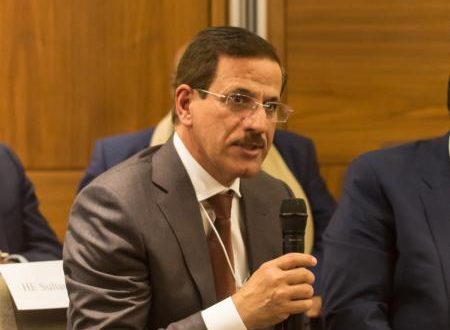A review of the World Logistics Passport initiative, which was recently launched by the UAE, took place on the sidelines of the 50th World Economic Forum in Davos, Switzerland, during which Sultan bin Saeed Al Mansoori, UAE Minister of Economy, confirmed that the initiative is a distinct example of the pioneering approach adopted by the UAE for the realisation of its vision for development.
“The initiative is set to benefit many countries around the world and will redefine the development of the shipping industry by creating necessary technologies and capabilities, opening up new paths for trade linking the East with the West, and enhancing Dubai’s and the UAE’s position in supporting global trade and economy. This forms an important aspect of the development strategy adopted by the UAE, in line with the new directives announced by His Highness Sheikh Mohammed bin Rashid Al Maktoum, Vice President, Prime Minister and Ruler of Dubai. It aims to position Dubai as the capital of the new economy in the region and to achieve the ambitious target of two trillion dollars in revenue from Dubai’s non-oil foreign trade by 2025,” said Al Mansoori.
The UAE attended the discussion, in the presence of H.H Sheikh Ahmed bin Saeed Al Maktoum, President of the Dubai Civil Aviation Authority and Chairman and CEO of the Emirates Group, with the participation of Sultan bin Saeed Al Mansoori; Sultan bin Sulayem, Group Chairman and CEO of DP World and leader of the Dubai Logistics World initiative; and Nadya Kamali, CEO of Customs World.
During the discussion, Nadya Kamali said, “We have launched the World Logistic Passport in Dubai, with an aim to offer its services at the global level in order to serve the shared business cooperation goals of all countries.”
The session, which saw the discussion on the World Logistics Passport initiative, was attended by ministers, government officials and leaders from major countries along the South-South trade corridor, on which the initiative is currently focused. These include Colombia and Brazil from Latin America; Ethiopia, Nigeria, Rwanda, South Africa, and Zimbabwe from the African continent; and India, Thailand, and Vietnam from Asia.
Fadi Farra, Co-founder and Partner at the public policy and strategy advisory firm, underlined the need to re-think trade, in view of protectionist policies, rising costs and the development of new trade hubs in developing regions that have led to a global trade industry with increased volatility and uncertainty.
Among the key stakeholders from more than 20 countries that participated in the session were Demeke Mekonnen Hassen, Deputy Prime Minister, Ethiopia; Joao Doria, Governor of the State of Sao Paulo, Brazil; Morten Engelstoft, CEO APM, A.P Moller-Maersk; Jeroen van der Veer, Chairman, Royal Philips; Henadi Al Saleh, Chairwoman, Agility Logistics; Kamal Nath, Chief Minister of Madhya Pradesh, India; Angela Maria Orozco, Minister of Transport, Colombia; Manpreet Badal, Minister of Finance and Planning of Punjab, India; Zainab S. Ahmed, Ministry of Finance, Budget and National Planning, Nigeria; Adnan Kazim, Chief Commercial Officer of Emirates Group; Jacques Vandermeiren, CEO, Antwerp Port Authority; Paula Ingabire, Minister of Information, Communications Technology and Innovation, Rwanda; and Yasushi Kinoshita, Managing Executive Officer, Development Bank of Japan.
 UAE BARQ برق الإمارات – نبضك
UAE BARQ برق الإمارات – نبضك


